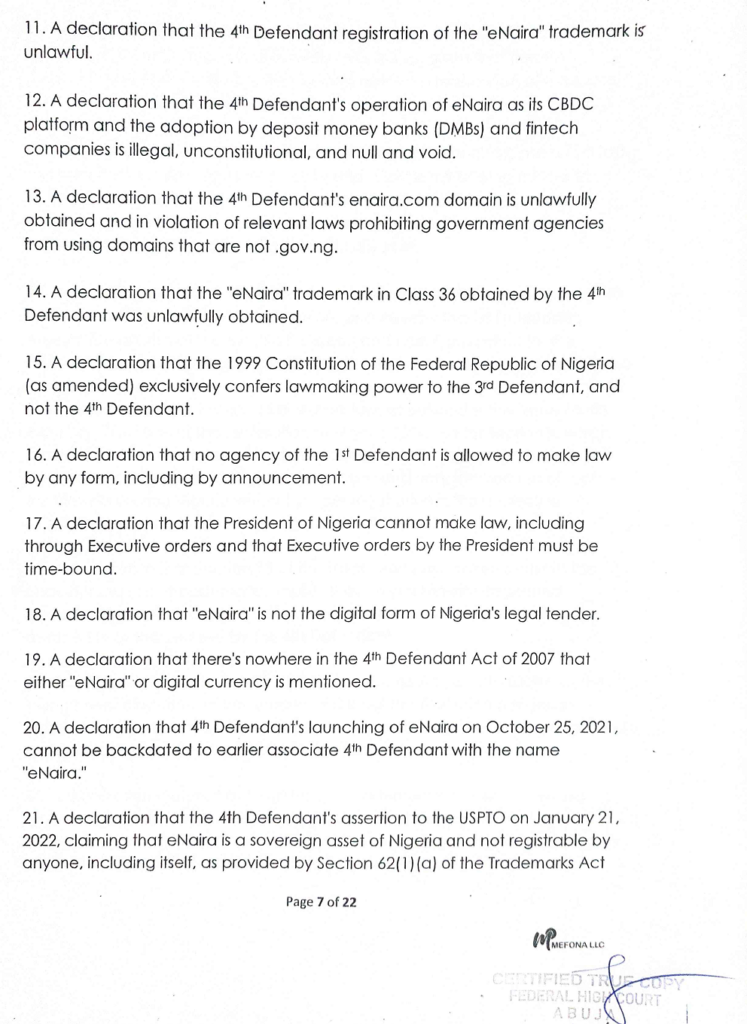In a recent development, the Central Bank of Nigeria (CBN) has become embroiled in a complex situation concerning Mefona LLC’s eNaira trademark application in the United States. This case underscores the significance of intellectual property rights in an increasingly globalized world and highlights the necessity for transparent processes.
In August 2022, the CBN requested the United States Patent and Trademark Office (USPTO) to withdraw or cancel Mefona LLC’s eNaira trademark application. The CBN claimed that eNaira is a sovereign asset of Nigeria and cannot be registered anywhere by anyone, including the CBN itself.
However, it was later revealed that the CBN had applied for the eNaira trademark in class 36 in Nigeria on November 1, 2021, and had its application published on November 18, 2021. This information indicates that while the CBN was opposing Mefona’s application, it had already secured the trademark for itself in Nigeria.
Upon discovering this contradiction, Mefona LLC sent a pre-legal action letter to the CBN in July 2023. The letter demanded an explanation for why the CBN referred to eNaira as a sovereign asset while simultaneously holding the eNaira trademark in Nigeria. In response, the CBN addressed the pre-legal action demands but avoided the core issues of trademark possession and the claim of eNaira being a sovereign asset, leading to Mefona’s lawsuit.
Meanwhile, the USPTO has maintained its position that eNaira is a sovereign asset, despite the lack of supporting evidence.
In response to these findings, Mefona LLC filed a lawsuit in Nigeria (Suit No. FHC/ABJ/CS/994/2024) against the CBN, the Trademark Registrar, and others. The lawsuit seeks, among other things:
- Recognition that the CBN applied for and holds the eNaira trademark in Nigeria.
- Acknowledgment that eNaira cannot be considered a sovereign asset of Nigeria if the CBN holds the trademark.
- Confirmation that the CBN cannot lawfully oppose Mefona’s eNaira trademark application without violating the doctrine of territoriality that governs trademark rights internationally.
Additionally, the CBN’s objection letter dated January 21, 2022, allegedly accused Mefona of blackmail for filing its eNaira trademark application in the U.S. Such an accusation involves making threats to gain an advantage and requires clear evidence, as outlined under:
– Criminal Code Act: (Nigeria), addressing extortion and threats.
– 18 U.S. Code § 873, concerning blackmail under U.S. federal law.
White and Case LLP also alleged that Mefona’s eNaira trademark application is unlawful and demanded that Mefona withdraw its application. However, they failed to provide evidence to justify these demands. Such false accusations by White and Case LLP could be considered defamatory, as they unjustly harm Mefona’s reputation. Relevant U.S. laws addressing defamation include:
– 15 U.S. Code § 1114: Relates to trademark infringement, including false claims that damage a trademark applicant’s/owner’s reputation.
– 18 U.S. Code § 1001: Addresses false statements made to federal authorities, including misleading claims in legal documents.
If the CBN believes Mefona’s application infringes on its rights, it should have provided convincing evidence grounded in international trademark protocols and conventions rather than resorting to unsupported claims.
This case underscores a critical issue: the need for a fair and transparent process in handling trademark applications and intellectual property rights. The doctrine of territoriality, which governs trademark rights internationally, must be respected to ensure that businesses can operate in a fair and just environment.
Furthermore, this situation highlights broader challenges faced by smaller businesses and innovators in protecting their intellectual property rights. Ensuring protection for such entities is vital for fostering innovation and economic growth.
As this legal battle unfolds, it is crucial to stand up for what is right. Mefona LLC’s determination to protect its intellectual property rights exemplifies the resilience needed to bring about meaningful change.
The global community must take note of this case and ensure that justice prevails. By doing so, we can foster a world where innovation is encouraged, competition is fair, and the rule of law is upheld.
